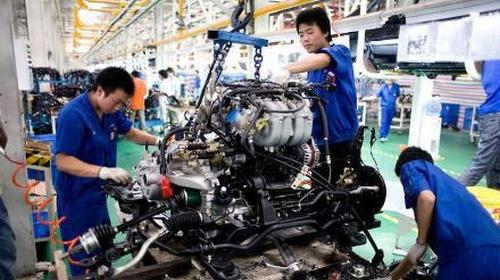Bright prospects for Vietnamese economy in 2013
(VOV) -Prof. Dr. Tran Hoang Ngan granted VOV online an exclusive interview on the country’s economic situation in 2013, analyzing its difficulties, challenges, and opportunities.
Reporter: What do you expect from the country’s economy in 2013?
Prof. Dr. Ngan: Vietnam and the world suffered a tough economic situation in 2012. The global economy remained unstable due to a double recession.
Vietnam succeed in stabilsing its macroeconomy, lowering the inflation rate to 6.81 percent compared to 2011’s 18.13 percent, recording a US$10 billion balance of payment surplus, increasing foreign exchange reserves, and applying stricter controls on public investment.
Intimidating obstacles are expected in 2013, including pressures from fluctuating inflation, macroeconomic instability, the possibility of business dissolutions, excess good stocks, a sluggish real estate market, worrying bad debt levels, and sluggish economic restructuring.

Reporter: Is there any hope for local businesses this year?
Prof. Dr. Ngan: Vietnam is lucky to know its economic weaknesses. It’s now time to tackle the issues.
First, the country needs to handle commercial banks’ bad debts and restructure the real estate market.
Earlier this year, the government issued two important resolutions furthering the national economic restructuring process involving public investments, state owned enterprises, commercial banks, and financial markets.
These systematic measures address bottlenecks in the economy by resolving bad debts, supporting markets, providing loans to businesses to reduce production costs, and extending the payment deadlines for and returning some proportion of taxes.
There are also concrete solutions to the real estate market’s problems. Customers will be offered preferential credit policies with low interest and long repayment schedules, and housing projects will be adjusted to meet market demand.
Reporter: How do banks implement the government’s resolutions?
Prof. Dr. Ngan: In addition to curbing inflation, maximum mobilsing interest rates have been lowered to eight percent in 2012. Many commercial banks have also decreased their lending interest rates.
Only a small number of businesses enjoyed the 11 percent borrowing rates—total outstanding debt increased by 8.9 percent last year, the lowest in recent history.
Banks should therefore implement all measures in the government’s resolutions.
The government should try to rapidly expand credit guarantee funds as a way of helping private enterprises access commercial bank loans
Businesses need the government and the State Bank of Vietnam’s (SVB) Governor to keep their commitment of maintaining mobilising interest rates at 7–8 percent and lending rates at 11–12 percent.

Reporter: Should the government allow the dissolution of poorly performing banks?
Prof. Dr. Ngan: Like the human cycle of birth, old age, sickness, and death, the economy itself has a cycle of prospect, crisis, recession and recovery, and businesses have processes of establishment, operation, development, recession, and bankruptcy,
Bank dissolutions are special as they can negatively impact both depositors and debtors.
In my opinion, some weak Vietnamese commercial banks in Vietnam should be dissolved like others in Thailand and Indonesia in 1997–1998 and in the US in 2008–2009.
Vietnam recently witnessed some mergers and acquisitions, such as the ones between De Nhat Bank, Vietnam Tin Nghia Bank, and Saigon Commercial Bank, and between the Habubank and SHB.
Reporter: What should Vietnam’s preferential policy focus on: growth, inflation, credit, or fiscal issues?
Prof. Dr. Ngan: Vietnam has to maintain macroeconomic stability and control inflation while perpetuating a reasonable rate of development.
It should initially help businesses overcome troubles, handle bad debts, and access low interest credits.
The country can also benefit from external support like a global economic recovery, the reduction of European public debts, better international security, and stable global fuel prices.
Reporter: What should the Vietnamese market do to regain people’s confidence?
Restoring people’s confidence is a long time process requiring great patience, consistency, and determination.
First, the government’s two resolutions need to be promptly implemented. The government’s policy must be predictable and coherent while the cabinet members’ market management should be undertaken with the backing of consensus.
